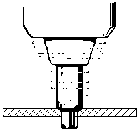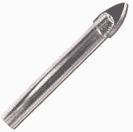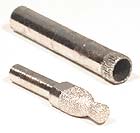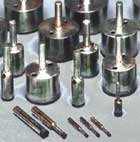
|
 |
|
Material Characteristics
and Drill Bit Types
|
Copyright DiamondSure 1998-2015
Use and Reproduction is Restricted
See
Copyright Information
www.DiamondSure.com
|


Carbide Tipped
Spear
Point Drill Bit
|
.Return
to top
Materials for
Diamond Drill Bit Use
Bonded Diamond Drill Bits are
used on glass, stained glass, ceramics, ceramic tile, porcelain,
porcelain tile, limestone, marble, granite, slate, stone and
fiberglass. Drills used on wood or metal have a sharp metal
tip or teeth, that cut into the material. These types of
drills do not work on glass, marble, etc. as the tips do not
"bite" into the extremely hard material, and cause
heat build-up that burns up the bit and causes "heat fractures"
in the material.
Carbide tipped Spear Point
drills are sometimes used on the "softer" types of
hard materials - like untempered glass, sandstone and marble
and some of the less hard ceramic and porcelain tiles.
While they sometimes work, they tend to chip the hard surface
very badly, leaving a rough hole and often cause breakage due
to fractures from the chipping and heat. Diamond drill
bits are designed differently - they have diamond tips that "grind"
into the extremely hard materials.
Old fashioned
Spear Point carbide bits no longer work
on
the new type of super-hard floor, counter and wall tiles.
Diamond
Drill Bits are the Solution. |
An extensive detailed listing
of specific materials and specific applications for using electroplated
diamond drill bits is shown in the Drill Bit Uses section of
our web site. Diamond Drill
Bit Uses: <Click Here>
While diamond drill bits are
designed for drilling in extremely hard materials, Electroplated
Diamond Drill Bits are NOT designed for use on metal, concrete
or masonry materials. For drilling in concrete, masonry,
and metals such as iron, cast iron and steel, a carbide tipped
drill bit must be used. Do not use Electroplated Diamond
Drill Bits on concrete, masonry or metal.
The sections below discuss the
characteristics of various materials and the special techniques
for using diamond drill bits on those materials. The most
important factors are to use a slow to very slow drill speed,
low drill pressure, and plenty of water for lubrication.
Variable speed drills work best since the proper speed can be
selected Some fixed-speed drills have a minimum speed of
600 or 800 rpm, that may be too fast for many diamond drill applications
(see speed chart). Impact type "hammer drills"
should never be used with diamond drills bits. |
|

Top - Core Drill Bit
Bottom
- Blunt Nose Bit

Core Drill Bits
|
.Return
to top
Types and Styles
of Diamond Drill Bits
Diamond drill bits come in many
different sizes and shapes but are primarily of two basic styles,
blunt nose bits and core drill bits. There
are also two basic types of diamond drill bits relating to the
application of the diamonds; bonded and sintered.
Blunt nose bits are solid at
the tip and have diamonds on the tip and on the sides of the
tip. This style of bit drills a complete hole by grinding
a full hole the size of the tip. Core drill bits however,
are hollow at the tip. They have diamonds along the edge
of the tip and slightly up the sides of the tip, similar to a
margarita glass that has been "rimmed" with salt.
Diamond core drill bits grind or saw a circle at the edge of
the tip rather than the full diameter of the tip. A core
drill results in a hole the size of the tip and a smaller "core"
or "plug" that comes from the middle of the hole.
Core drills are often called hole saws, since they grind
or saw a circle to create a hole.
Since Blunt Nose bits drill out
the complete hole, they are only effective for smaller holes.
This style of diamond bit is only available in sizes up to about
3/8" and are used primarily on glass. Blunt Nose bits
are not designed for extremely hard materials such as stone or
ceramic and porcelain tile. Core drills only drill out
a portion of the resulting hole, so they tend to drill much faster
than blunt nose drills. Core drills can be used to drill
large holes and can be used on most non-ferrous hard materials
such as glass, stained glass, ceramic, porcelain and fiberglass,
ceramic or porcelain tile, limestone, slate, marble, granite
and other stone materials.
Bonded diamond drill bits have
the diamonds bonded to the the edges of the drill bit tip, generally
using an electroplate bonding process. These drill bits
are generally slow-speed bits and are fairly inexpensive.
During use, the diamonds eventually wear off of the bit due to
the hardness and abrasiveness of the material being drilled.
Bonded diamond drill bits must not be used on metal, concrete,
or masonry and require proper speed and adequate water lubrication.
Sintered diamond bits have the
diamonds mixed directly into or embedded in the steel tip.
As the metal tip wears down, new diamonds come to the surface.
Some 'sintered' diamond drill bits are designed for use on metal,
concrete or masonry, however, the specific manufacturer's recommendations
must be reviewed. Sintered diamond drills are generally
high-speed bits and are somewhat long-lasting, however, they
are also extremely expensive.
The life of any type of diamond
drill bit depends upon the hardness, abrasiveness and thickness
of the material being drilled and the specific drilling techniques
used (drill speed, pressure and lubrication), however, the diamonds
of a drill bit don't actually wear out as much as they
wear off due to heat and friction caused by the extreme
hardness and abrasiveness of the material drilled.
Drilling in glass, ceramic, marble,
etc. is a slow process compared to softer materials such as wood
or even metal. A fairly deep hole can be drilled in wood
in just a few seconds, while it can take 20 or 30 seconds or
longer to drill a hole in standard 1/8" thick glass.
In some very hard stones and tiles, it may take 2 to 3 minutes
to drill only 1/4" deep. Using diamond bits to drill
in hard materials is not difficult, however, it takes time.
A person should consider that they aren't 'drilling' a hole,
as much as 'grinding' a hole. |
|
.Return
to top
Material Hardness
& Abrasiveness
Materials have varying degrees
of hardness and abrasiveness. Additionally, specific man-made
and natural materials can differ greatly depending upon the exact
physical composition. For example, glass varies in hardness
depending upon color and type, since various metals and minerals
are added to achieve the different types and colors. Glass
also has differing degrees of "temper" depending upon
the specific manufacturing methods used. Ceramics, ceramic
tile, porcelain and porcelain tile are various forms of vitrified
glass like material. They also have differing hardness
and abrasiveness depending upon the type, composition, manufacturer
and manufacturing methods used.
The hardness and abrasiveness
of natural materials, such as stone, vary by type, but they also
vary significantly within a specific type. Most stones
are not pure - they are mixtures of various types of rock.
Granite, for example, contains various combinations of primarily
quartz, feldspar, black mica and hornblende. Therefore,
a specific stone type such as granite or marble, will vary significantly
in hardness and abrasiveness depending upon the exact mineral
composition that varies by quarry location.
Below is a table of the hardness
of various materials. The table uses the standard Knoop
Hardness Scale (kg/mm2). The Knoop scale is a linear scale,
so a rating of 100 means the material is twice as hard as something
rated as a 50. The hardest known material is Diamond, with
a Knoop measurement of 7,000. Tungsten Carbide, used in
carbide drill bits, is the hardest natural material next to Diamond.
However, with a measurement of 2,000, Tungsten Carbide is only
30% as hard as Diamond.
Material Hardness
Material
Wood - Pine
Copper
Limestone
Marble
Slate
Porcelain Fixtures & China
Glass
& Ceramic
Ceramic Wall Tile
Porcelain
Wall Tile
Porcelain Floor Tile
Marble
Style Porcelain Floor Tile
Granite Style Porcelain
Floor Tile
Agate
Granite
Quartz
Tool Steel
Tungsten Carbide
Diamond
|
Knoop
Hardness Scale
10
120
125 - 150
140 - 180
140 - 250
400
- 500
400 - 550
450 - 550
500
- 650
500 - 650
500 - 650
500
- 650
500 - 600
550 - 650
800
- 850
700 - 900
2,000
7,000
|
|
Copyright
DiamondSure 1998-2015
Use and Reproduction
is Restricted
See
Copyright Information
www.DiamondSure.com |
|
.Return
to top
Relative Hardness
of Drill Bits vs Materials
Most people are very familiar
with drilling in common wood such as fir or pine. When
a good steel drill bit is used to drill wood, the bit is about
80 times as hard as the wood. Carbide is considerably harder
than steel and if a carbide bit is used in wood, the hardness
ratio is about '200 to 1'.
By comparison, when using a carbide
bit to drill in hard porcelain tile, a carbide drill bit is only
about 3 times as hard as the material being drilled. The
low hardness ratio of only about '3 to 1' helps a person understand
the extreme hardness of today's porcelain tile.
Relative Hardness
Drilling
Task
Drill Common Wood with
-
Drill Glass
with -
Drill Porcelain Tile with - |
Drill Bit
Steel
Drill Bit
Carbide Drill Bit
Steel Drill Bit
Carbide Drill Bit
Diamond Drill Bit
Steel
Drill Bit
Carbide Drill Bit
Diamond
Drill Bit |
Hardness
Ratio
80 to 1
200 to 1
3 to 1
6 to 1
22 to 1
1 to 1
3 to 1
12 to 1 |
|
The highest grade of porcelain
tile is now as hard as granite. In fact, it is basically
man-made granite. The low hardness ratio for a carbide
bit explains why the newer porcelain tiles can't be drilled with
a carbide bit. Or if they can be drilled, bit life is calculated
not as the "number of holes per bit", but rather the
"number of bits per hole".
Diamond bits are the only solution
for drilling in today's super-hard porcelain tile. Diamond
is the hardest known natural material and is nearly 4 times as
hard as tungsten carbide.
Yet, even with even when using
a diamond bit on drill today's porcelain tile, the bit is still
only about 12 to 14 times as hard as the material being drilled.
Compared to the wood example of an '80 to 1' or '200 to 1' hardness
ratio, shows why even diamond drill bits require good drilling
techniques and have a limited life when drilling in today's hard
materials.
Copyright
DiamondSure 1998-2015
Use and Reproduction
is Restricted
See
Copyright Information
www.DiamondSure.com |
DiamondSure - Manufacturer
of Diamond drill bits and diamond tools for glass, tile, ceramics
and stone.
|
|
© |
Copyright DiamondSure
1998-2020
All web site content, including images,
pictures,
graphics, layout designs, wording content and organization, are
the
exclusive registered property of DiamondSure.
See
Copyright
Information |
|
|

|
Site
Index
| Contact
Us |
Privacy
. |
|




